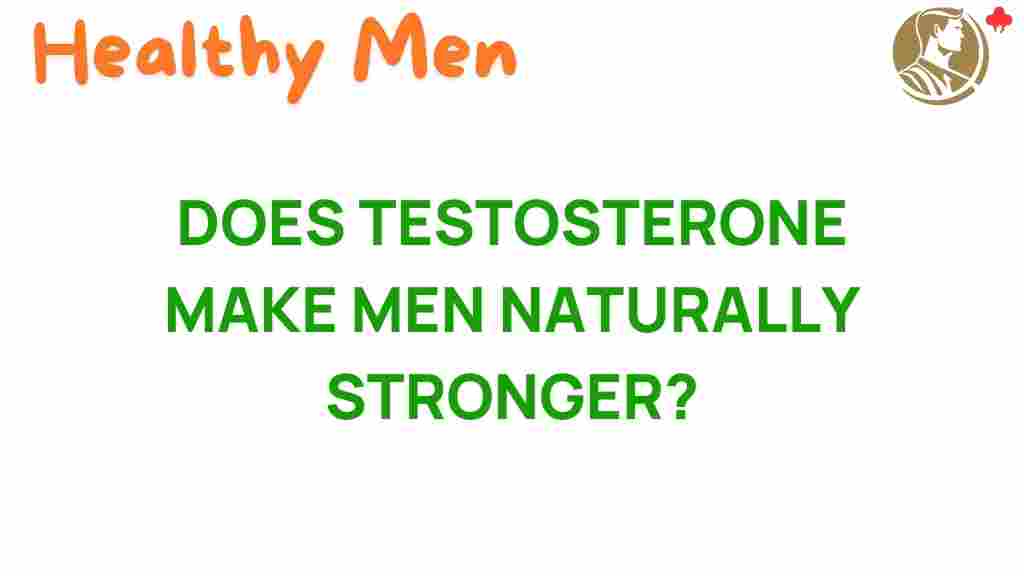Unveiling the Truth: Does Testosterone Make Men Naturally Stronger?
Testosterone is a powerful hormone that plays a pivotal role in the overall health and fitness of men. As the primary male sex hormone, it not only influences sexual development but also significantly impacts strength, muscle growth, and athletic performance. In this article, we will explore the relationship between testosterone, strength, and overall fitness in men, revealing the truth behind this vital hormone.
Understanding Testosterone
Testosterone is produced mainly in the testes and, to a lesser extent, in the adrenal glands. It is responsible for a range of functions in the male body, including:
- Development of male reproductive tissues
- Promotion of secondary sexual characteristics
- Regulation of libido
- Facilitation of muscle growth and strength
- Influencing mood and cognitive function
As men age, testosterone levels typically decline, leading to various physical and mental changes. Understanding how testosterone affects strength and fitness is crucial for men seeking to maintain their health and vitality.
The Role of Testosterone in Muscle Growth
One of the most significant aspects of testosterone is its influence on muscle growth. Testosterone promotes the synthesis of proteins, which are essential for building muscle. Here’s how testosterone contributes to muscle growth:
- Increased Protein Synthesis: Testosterone enhances the body’s ability to synthesize proteins, leading to greater muscle mass.
- Reduction of Muscle Breakdown: Higher testosterone levels can decrease the rate of muscle protein breakdown, preserving muscle mass.
- Enhanced Recovery: Testosterone aids in faster recovery from workouts, allowing for more intense training sessions.
These factors combined highlight why testosterone is often linked to strength gains in men. When testosterone levels are optimal, men can achieve better fitness results and enhance their athletic performance.
Testosterone and Athletic Performance
Research has consistently shown that testosterone plays a significant role in athletic performance. Athletes with higher testosterone levels often exhibit:
- Increased strength
- Improved endurance
- Enhanced power output
- Better recovery times
For instance, various studies indicate that supplementation of testosterone in hypogonadal men (those with low testosterone levels) can lead to significant improvements in strength and muscle mass, thereby enhancing overall athletic performance. However, it’s essential to understand that the relationship between testosterone and performance is complex and influenced by other factors such as training, nutrition, and genetics.
Factors Influencing Testosterone Levels
Testosterone levels can be influenced by several factors, including:
- Age: Testosterone levels peak in early adulthood and gradually decline with age.
- Body Composition: Higher body fat percentages can lead to lower testosterone levels.
- Physical Activity: Regular exercise, especially resistance training, can boost testosterone levels.
- Sleep Quality: Poor sleep can negatively impact hormone levels, including testosterone.
- Nutrition: A balanced diet rich in healthy fats, proteins, and essential nutrients supports optimal testosterone production.
Men looking to enhance their strength and fitness should focus on these factors to maintain healthy testosterone levels.
Steps to Naturally Boost Testosterone Levels
For men seeking to increase their testosterone levels naturally, here are some effective strategies:
1. Engage in Regular Exercise
Resistance training and high-intensity interval training (HIIT) are particularly effective in boosting testosterone levels. Aim for:
- At least 150 minutes of moderate exercise or 75 minutes of vigorous exercise per week.
- Incorporate weightlifting into your routine at least 2-3 times a week.
2. Maintain a Balanced Diet
Focus on a diet that includes:
- Healthy fats (avocados, nuts, olive oil)
- Lean proteins (chicken, fish, legumes)
- Fruits and vegetables rich in vitamins and minerals
Consider incorporating foods that are high in zinc and vitamin D, as these nutrients are essential for testosterone production.
3. Prioritize Quality Sleep
Aim for 7-9 hours of quality sleep per night. Poor sleep can lead to a significant drop in testosterone levels. Consider the following tips for better sleep:
- Establish a regular sleep schedule.
- Create a comfortable sleep environment.
- Avoid screens before bedtime.
4. Manage Stress Levels
Chronic stress elevates cortisol levels, which can negatively affect testosterone. Consider stress-reduction techniques such as:
- Meditation
- Yoga
- Deep breathing exercises
5. Consider Natural Supplements
Some natural supplements may help boost testosterone levels, including:
- Fenugreek
- D-Aspartic Acid
- Ginger Extract
As always, consult with a healthcare professional before starting any new supplement regimen.
Common Myths About Testosterone and Strength
There are several misconceptions about testosterone that can lead to confusion:
- Myth 1: Only bodybuilders need to worry about testosterone levels.
- Myth 2: All testosterone supplements are safe and effective.
- Myth 3: Higher testosterone always means better health.
Understanding these myths is crucial for men who want to make informed decisions about their health and fitness.
Troubleshooting Low Testosterone Levels
If you’re experiencing symptoms of low testosterone, such as fatigue, reduced strength, or decreased libido, consider the following troubleshooting tips:
- Consult a Healthcare Professional: A doctor can conduct tests to assess your hormone levels and overall health.
- Review Your Lifestyle: Evaluate your diet, exercise routine, and sleep habits, and make necessary changes.
- Consider Psychological Factors: Address any mental health issues, such as depression or anxiety, that may contribute to low testosterone.
Conclusion
In conclusion, testosterone plays a vital role in the strength, fitness, and overall health of men. While it is a critical hormone for muscle growth and athletic performance, maintaining balanced testosterone levels involves a multifaceted approach that includes exercise, nutrition, sleep, and stress management. By understanding the truth about testosterone and its effects, men can take proactive steps to enhance their vitality and fitness.
For more information on men’s health and fitness, explore our resources here. Additionally, you can check out more about testosterone and its effects on health here.
This article is in the category Fitness and created by healthymen Team
